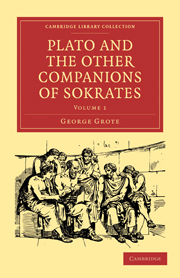Book contents
- Frontmatter
- PREFACE
- Contents
- CHAPTER I SPECULATIVE PHILOSOPHY IN GREECE, BEFORE AND IN THE TIME OF SOKRATES
- CHAPTER II GENERAL REMARKS ON THE EARLIER PHILOSOPHERS—GROWTH OF DIALECTIC—ZENO AND GORGIAS
- CHAPTER III LTFE OF PLATO
- CHAPTER IV PLATONIC CANON, AS RECOGNISED BY THRASYLLUS
- CHAPTER V PLATONIC CANON AS APPRECIATED AND MODIFIED BY MODERN CRITICS
- CHAPTER VI PLATONIC COMPOSITIONS GENERALLY
- CHAPTER VII APOLOGY OP SOKRATES
- CHAPTER VIII KRITON
- CHAPTER IX EUTHYPHRON
- CHAPTER X ALKIBIADES I. AND II.
- CHAPTER XI HIPPIAS MAJOR—HIPPIAS MINOR
- CHAPTER XII HIPPARCHUS—MINOS
- CHAPTER XIII THEAGES
- CHAPTER XIV ERASTÆ OR ANTERASTÆ—RIVALES
- CHAPTER XV ION
- CHAPTER XVI LACHES
- CHAPTER XVII CHARMIDES
- CHAPTER XVIII LYSIS
- CHAPTER XIX EUTHYDEMUS
CHAPTER II - GENERAL REMARKS ON THE EARLIER PHILOSOPHERS—GROWTH OF DIALECTIC—ZENO AND GORGIAS
Published online by Cambridge University Press: 05 October 2010
- Frontmatter
- PREFACE
- Contents
- CHAPTER I SPECULATIVE PHILOSOPHY IN GREECE, BEFORE AND IN THE TIME OF SOKRATES
- CHAPTER II GENERAL REMARKS ON THE EARLIER PHILOSOPHERS—GROWTH OF DIALECTIC—ZENO AND GORGIAS
- CHAPTER III LTFE OF PLATO
- CHAPTER IV PLATONIC CANON, AS RECOGNISED BY THRASYLLUS
- CHAPTER V PLATONIC CANON AS APPRECIATED AND MODIFIED BY MODERN CRITICS
- CHAPTER VI PLATONIC COMPOSITIONS GENERALLY
- CHAPTER VII APOLOGY OP SOKRATES
- CHAPTER VIII KRITON
- CHAPTER IX EUTHYPHRON
- CHAPTER X ALKIBIADES I. AND II.
- CHAPTER XI HIPPIAS MAJOR—HIPPIAS MINOR
- CHAPTER XII HIPPARCHUS—MINOS
- CHAPTER XIII THEAGES
- CHAPTER XIV ERASTÆ OR ANTERASTÆ—RIVALES
- CHAPTER XV ION
- CHAPTER XVI LACHES
- CHAPTER XVII CHARMIDES
- CHAPTER XVIII LYSIS
- CHAPTER XIX EUTHYDEMUS
Summary
Variety of sects and theories—multiplicity of individual authorities is the characteristic of Greek philosophy
The first feeling of any reader accustomed to the astronomy and physics of the present century, on considering Variet of the various theories noticed in the preceding chapter, is a sort of astonishment that such theories should have been ever propounded or accepted as true. Yet there can be no doubt that they represent the best thoughts of sincere, contemplative, and in genious men, furnished with as much knowledge of fact, and as good a method, as was then attainable. The record of what such men have received as scientific truth or probability, in different ages, is instructive in many ways, but in none more than in showing how essentially relative and variable are the conditions of human belief; how unfounded is the assumption of those modern philosophers, who proclaim certain first truths or first principles as universal, intuitive, self-evident; how little any theorist can appreciate á priori the causes of belief in an age materially different from his own, or can lay down maxims as to what must be universally believed or universally disbelieved by all mankind. We shall have farther illustration of this truth as we proceed: here I only note variety of belief, even on the most fundamental points, as being the essential feature of Grecian philosophy even from its outset, long before the age of those who are usually denounced as the active sowers of discord, the Sophists and the professed disputants. Each philosopher followed his own individual reason, departing from traditional or established creeds, and incurring from the believing public more or less of obloquy; but no one among the philosophers acquired marked supremacy over the rest.
- Type
- Chapter
- Information
- Plato and the Other Companions of Sokrates , pp. 87 - 112Publisher: Cambridge University PressPrint publication year: 2010First published in: 1865



